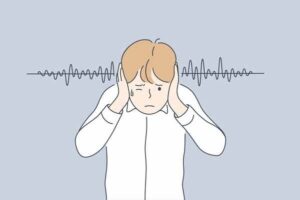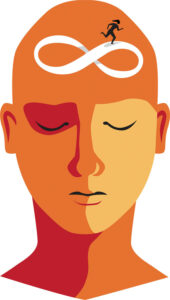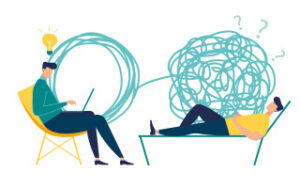Do you ever find yourself feeling trapped in your own thoughts? Do you have persistent, unwanted and distressing ideas that just won’t go away? If so, know that you’re not alone. Intrusive thoughts are a common occurrence for many people, but when do they become problematic enough to seek help? In this article, we’ll explore the signs and symptoms of intrusive thoughts and offer guidance on when it’s time to reach out for professional support. So come along with us as we delve into the world of intrusive thoughts and discover what steps you can take towards finding relief.
Contents
What are Intrusive Thoughts?

Intrusive thoughts are unwelcome, involuntary thoughts that can cause great distress. They can be about anything that might cause anxiety, including healthy activities like sex or driving. People with OCD often have difficulty distinguishing between what is real and what is not, and may believe that their intrusive thoughts are true and will come to pass, no matter how unlikely they may be.
OCD sufferers often try to suppress or neutralize their intrusive thoughts with other thoughts or behaviors (called compulsions). However, this only reinforces the original fear and causes further distress. If you are struggling to manage your intrusive thoughts, it may be time to seek professional help.
Causes of Intrusive Thoughts
There are many potential causes of intrusive thoughts. They may be the result of stress, anxiety, or a traumatic event. Intrusive thoughts may also be a symptom of an underlying mental health condition, such as OCD or PTSD. If you’re struggling to manage your intrusive thoughts, it’s important to seek help from a mental health professional.
Symptoms of Intrusive Thoughts
If you’re experiencing intrusive thoughts, you may feel like you’re losing control of your mind. You may feel like your thoughts are racing, and you can’t stop them. Intrusive thoughts can be about anything that causes you anxiety or fear. They can be about harm coming to yourself or others, or about something bad happening. Intrusive thoughts can also be sexually explicit or violent in nature. If you’re having intrusive thoughts, you may also experience other symptoms, such as:
-Feeling on edge or stressed
– Difficulty concentrating
– Trouble sleeping
– Irritability
– Depression
– Anxiety
Treatments for Intrusive Thoughts
 If you are experiencing intrusive thoughts, it is important to seek help from a mental health professional. There are many different treatment options available for intrusive thoughts, and a mental health professional can help you choose the best treatment for your specific needs.
If you are experiencing intrusive thoughts, it is important to seek help from a mental health professional. There are many different treatment options available for intrusive thoughts, and a mental health professional can help you choose the best treatment for your specific needs.
Cognitive-behavioral therapy (CBT) is one of the most effective treatments for intrusive thoughts. CBT helps you to identify and change the negative thinking patterns that contribute to your intrusive thoughts.
Exposure and response prevention (ERP) is another effective treatment for intrusive thoughts. ERP involves gradually exposing yourself to the things that trigger your intrusive thoughts, while learning to control your urge to respond to them in a compulsion.
Medication can also be helpful in treating intrusive thoughts. Antidepressants and anti-anxiety medications can be used to reduce the intensity of your intrusive thoughts, or to help manage the symptoms related to them.
Finally, mindfulness techniques can help you become aware of your intrusive thoughts in a nonjudgmental way, and accept them without acting on them. This will help you to better manage your intrusive thoughts over time.
When to Seek Help for Intrusive Thoughts
Intrusive thoughts are common and usually aren’t a cause for concern. However, if they’re causing you distress, interfering with your daily life, or leading to harmful behaviors, it may be time to seek help.
There are many effective treatment options available for intrusive thoughts, so don’t hesitate to reach out for help if you’re struggling. Here are some signs that it may be time to seek professional help:
• The thoughts are persistent and frequent
• You can’t control or stop the thoughts
• The thoughts are having a negative impact on your life (e.g., causing anxiety, depression, or interfering with work or personal relationships)
• You’re engaging in compulsive behaviors in an attempt to control the thoughts (e.g., excessive hand-washing, checking, or mental rituals)
If you’re experiencing any of these signs, please reach out for help from a mental health professional. With treatment, most people are able to effectively manage their intrusive thoughts and live happy and fulfilling lives.
How do you help someone with intrusive thoughts?
There are many ways to help someone who is struggling with intrusive thoughts. Here are a few suggestions:
-Encourage the person to talk about their thoughts and feelings. This can help them to feel more in control of their thoughts and may help to lessen the intensity of the thoughts.
-Help the person to develop a healthy coping mechanism for dealing with their intrusive thoughts. This could involve deep breathing exercises, relaxation techniques, or journaling.
-Challenge the person’s negative beliefs about themselves that may be fuelling their intrusive thoughts. Help them to see that they are not their thoughts and that they can choose how to react to them.
-Encourage the person to seek professional help if their intrusive thoughts are proving to be too much to handle on their own. A therapist can provide additional support and guidance in managing intrusive thoughts.
Do intrusive thoughts go away with treatment?
 Intrusive thoughts are a common symptom of anxiety and other mental health conditions. While they can be distressing, intrusive thoughts usually don’t require treatment on their own. However, if intrusive thoughts are accompanied by other symptoms, such as anxiety or depression, seeking professional help can be beneficial.
Intrusive thoughts are a common symptom of anxiety and other mental health conditions. While they can be distressing, intrusive thoughts usually don’t require treatment on their own. However, if intrusive thoughts are accompanied by other symptoms, such as anxiety or depression, seeking professional help can be beneficial.
Cognitive-behavioural therapy (CBT) is the most effective treatment for intrusive thoughts. CBT can help you understand your thoughts and how to manage them. Medication may also be prescribed if needed.
Intrusive thoughts can be disturbing, but with treatment, they can be managed effectively. If you’re struggling to cope with intrusive thoughts on your own, reach out to a mental health professional for help.
Conclusion
Intrusive thoughts can be difficult to cope with, but the good news is that help is available. If you or someone you care about have been struggling with intrusive thoughts for a prolonged period of time, it’s important to seek professional help as soon as possible in order to start developing effective coping strategies and learn how to manage these difficult emotions. A mental health professional will be able to provide invaluable guidance and support on this journey.
For more information and guidance, please contact OCDMantra. OCD is a mental health disorder characterized by obsessions and compulsions. If you have any queries regarding OCD treatment, OCD Counseling, ERP therapy experienced therapists at OCDMantra can help: Book a trial OCD therapy session


